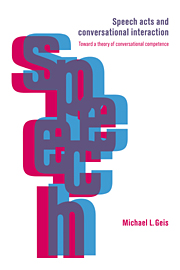6 - Conventions of use
Published online by Cambridge University Press: 16 October 2009
Summary
Introduction
The strongest argument that has been given in support of the thesis that indirect speech acts involve conventions of use – a pairing of a context of use and a purpose with a particular linguistic form – has been that close paraphrases of indirect speech act forms do not seem to have the same force as their models. Thus, although Do you want to open the door? can be used to request someone to open a door, Is it your present desire to open the door? normally cannot, or so it is claimed.
That there is conventionalization of form for function in the case of typical indirect speech act forms is demonstrated by the fact that (a) the conventional meanings of many such forms are arguably not compositional functions of the usual meanings of their parts, that (b) such sentences exhibit severe restrictions on combinations of auxiliary elements and main verbs that cannot be accounted for semantically, and that (c) there is no univocal semantic correlation between the sentence type of the utterance and the transactional work it does.
- Type
- Chapter
- Information
- Speech Acts and Conversational Interaction , pp. 141 - 183Publisher: Cambridge University PressPrint publication year: 1995



